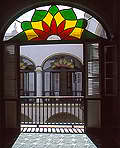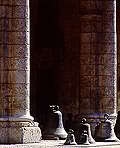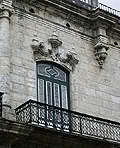|
After the sun architecture
is probably the single most important attraction for tourism
to Cuba. Visitors relish in old buildings, staggeringly extravagant
and avant-garde buildings spread the length and breadth of the
country. Cuban architecture stands out in a very special way
forming the island's environmental identity, mostly in the colonial
cities. The Hispanic model, from the popular architecture in
Southern Spain, was soon adopted to fulfil the requirements
of living in this tropical climate. It is architecture of wide
windows and balconies that make the house approachable and open.
The use of light-screening elements gives the houses a very
peculiar tone through grates and stained-glass windows. The
excellent writer Alejo Carpentier called Havana "the city of
pillars", because of the wide portals in the main avenues and
squares. Contrasts of texture and colour are created on the
facades, with the red roof-tiles and turned wood in the balustrade
of the balconies. During the 19th century, the neo-classic style
offered a touch of distinction to the architecture of the native
bourgeoisie. Evidence of this artistic design can be found at
the Palacio de Aldama and the Calzada del Cerro.
Several architectonic
styles influenced the urban spaces during the 20th century.
The art nouveau era imported by Catalonian artists; the eclecticism
that imposes and generalises itself; the neo-historicism and
the art deco, which introduced the modern movement of rationalist
style. All of our cities, especially Havana, offer buildings
of high patrimonial value due to the combination of multiple
styles that come together in a cosmopolitan visual delight.
The system of military
fortresses in the city and around the country is especially
attractive to visitors. The fortress of San Carlos de la Cabaña,
the biggest in America, and the Castillo de la Real Fuerza,
first bulwark castle in the continent, are both in Havana. Others
that can be visited are the Castillo de los Tres Reyes del Morro
and the Castillo de la Punta, in Havana; Castillo de Jagua in
Cienfuegos; San Pedro de la Roca in Santiago de Cuba and Fuerte
de Matachin in Baracoa. We could not leave this piece without
writing about Havana's famous Malicon, currently under refurbishment,
and due to be finished at the end of 2000. This multicoloured
mish-mash of architecture is the focus of 100's of thousand
of photos annually.
Two Cuban cities, Old Havana and
Trinidad, were proclaimed as Patrimony of Humanity for the way
they preserve their high architectonic values. Visiting Old
Havana today is a truly rewarding experience and one high on
the list of both architects and tourists worldwide.
|




|










































